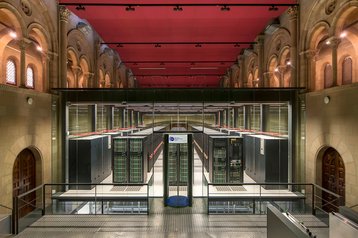The European High-Performance Computing Joint Undertaking (EuroHPC JU) has put out a new tender call for its planned MareNostrum 5 supercomputer after canceling the original tender last year. It also put out calls for entities interested in hosting Europe's first exascale supercomputer.
MareNostrum 5 back on
After long delays and a canceled tender, the EuroHPC JU is hoping for a fresh set of tenders for its long-planned MareNostrum 5 supercomputer.
“EuroHPC JU has launched a call for tender for the procurement of a pre-exascale supercomputer,” the agency said in a post announcing the call. “The system, called MareNostrum 5, will be hosted by the Barcelona Supercomputing Center (BSC) and will be capable of executing at least 205 Petaflops.”
The call requests tenders for the acquisition, delivery, installation, and hardware and software maintenance of the planned Spanish system.
“The EuroHPC JU seeks to procure a pre-exascale high-performance computer which will be specifically tailored to strengthen European medical research through drug research, the development of vaccines, virus spread simulations as well as artificial intelligence and big data processing applications. The machine will also support traditional HPC applications, such as climate research, engineering, material science, and earth sciences.”
First announced in 2019, MareNostrum 5 was originally meant to be delivered by December 2020 and set to be Europe’s most powerful supercomputer. However, in July 2021 the public procurement process for the system was canceled after the parties involved couldn’t agree on a vendor to supply the system. According to the document published on the EuroHPC site, voting results at a meeting “did not achieve the needed majority to reach an agreement to adopt the selected tender.”
At the time, Politico reported involved parties were divided over whether to focus on sovereignty and rely on local ‘made in Europe’ supply chains or buy the best available technology to better support research; a decision between a more Euro-centric Atos system vs a joint IBM-Lenovo bid couldn’t be reached. Despite the cancellation, BSC operations director Sergio Girona said at the time the BSC was continuing work on the facility due to host the new supercomputer and expected a new tender to be published shortly. The BSC inaugurated the new 12,000 sqm HQ building due to host MareNostrum 5 in October 2021.
With the new tender request, the EuroHPC JU is seemingly hoping it will be able to overcome the previous divisions. The estimated total value for the new call is €151.4 million ($171m); The EuroHPC JU will fund 50 percent of the total cost of the new system and the other 50 percent will be funded by a consortium comprising Spain, Portugal, and Turkey.
At 205 petaflops, MareNostrum 5 will still be the most powerful supercomputer in Europe despite the delay and within the top five of the Top500 list based on current performance listings. Currently, the most powerful HPC system in Europe is the 44 petaflops Atos Juwels Booster Module based at the Jülich Research Centre in Germany.
The closing date of the call is 31 January 2022. EuroHPC is targeting the installation of MareNostrum 5 beginning in Q3 2022 with operations beginning in 2023. The required PUE for the system should be less than 1.08.
Europe targets exascale
EuroHPC has also put out an expression of interest call to host Europe’s first exascale supercomputer. The call requests submissions for sites that want to host a ‘high-end supercomputer capable of executing at least 1 Exaflop’.
The EuroHPC JU notes it will be solely responsible for implementing the acquisition process, and will cover up to 50 percent of the system’s operating costs. The EU’s total financial contribution to the project is estimated to reach a maximum of €250 million ($282m).
“The EuroHPC JU shall acquire one high-end supercomputer in 2022 and shall own it. The Union financial contribution to the EuroHPC JU shall cover up to 50 percent of the acquisition costs plus up to 50 percent of the operating costs of the supercomputer,” notes the call. “The remaining total cost of ownership of the supercomputer shall be covered by the Participating State where the hosting entity is established or by the Participating States in the hosting consortium.”
The call outlines that the hosting entity should be able to host a system in the 20-25MW range and have 700 sqm (7,500 sq ft) of contiguous floor space available, have the required security and safety infrastructure, and access to staff required to operate it.
The costs related to the construction of the hosting site are not covered by the EuroHPC JU, but costs related to the preparation and adaptation of the hosting site may be partly covered.
Applications must be submitted by 14 February 2022 with an expected delivery date of mid-2023. Evaluation criteria will include costs, experience of hosting HPC systems, and quality of on-site IT & physical infrastructure.
The US is currently working on two exascale supercomputers – Aurora and Frontier – while China is thought to have already secretly launched two 1.3 exaflops supercomputers.
The next tranche of Europe’s mid-range supercomputers
EuroHPC JU has also put out a call for entities to host mid-range supercomputers of at least 15 Petaflops.
EuroHPC JU will co-fund up to 35 percent of the total cost of the mid-range supercomputers procured and co-own them. As with the exascale system, the costs related to the construction of the hosting site are not covered by the EuroHPC JU, but costs related to the preparation and adaptation of the hosting site may be partly covered.
Again, applications must be submitted by 14 February 2022; evaluation criteria will include costs, experience of hosting HPC systems, quality of on-site IT & physical infrastructure. Accepted hosts will be announced around June 2022, with a target deployment date of mid-2023. The call doesn’t specify how many entities might be accepted but the EuroHPC JU says it is planning ‘several’ systems.
So far the EuroHPC JU has procured seven supercomputers, located across Europe: Vega in Slovenia, MeluXina in Luxembourg, Discoverer in Bulgaria, Karolina in the Czech Republic, Deucalion in Portugal, LUMI in Finland, and Leonardo in Italy.






